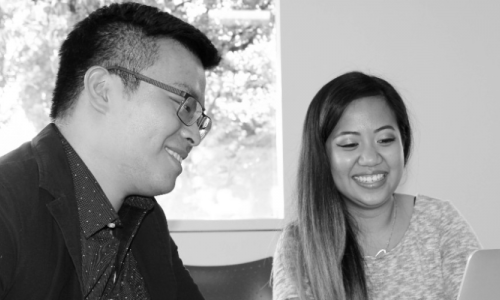
Compared to university graduates decades ago, students today are faced with an even greater number of career paths to choose from. How are we supposed to know which career to pursue? Common symptoms among students include fear and feeling overwhelmed. Despite graduating from Capilano College as a top student and valedictorian, Sean Aiken was not an exception, so he launched a project for which he tried out one job per week for 52 weeks to narrow down his passion. When asked what possessed him to initiate such a wacky project, he responded, “…far more wacky (than trying out different jobs) is the number of people who get out of bed in the morning and absolutely dread going to work because they hate their jobs.”
In February of 2011, I had a unique opportunity to attend a talk by Sean Aiken, who visited SFU to share his stories about the project. It was a must-attend event for me because I wanted to hear about the project from Sean’s personal point of view, and it surely was an exciting opportunity to watch him speak in person. Shortly after the event, I wanted to know more about the project, so I read his book The One-Week Job Project: 1 Man, 1 Year, 52 Jobs, which provided me with a bit more detail on each of the jobs he worked in throughout Canada and the U.S. Below is a list of ideas that I took away from the event and the book:
-
Not knowing what to do with your life is perfectly okay, as long as you continue exploring and doing meaningful things that can help you learn more about your aptitudes and interests.
-
Life is inherently uncertain so it is better to stay flexible and open-minded than to try to devise and follow a rigid plan. According to one career survey, only 2% of the respondents in the work force ended up doing what they thought they would do when they were under 20. This also ties into the idea of Chaos Theory of Careers.
-
School is important. Do your best to get the best grades you can, because the higher your GPA is, the greater number of opportunities will be open to you.
-
Real life experience is crucial. Immerse yourself in extracurricular activities and consider participating in Co-op or internship programs.
-
People whom you work with have a tremendous influence on your job satisfaction. Happy people seem to have two things in common: They like the people they work with; and they feel like they are making a difference in some way.
-
Money is important but it is not everything. After all, what use is there if you make millions of dollars a year but hate your job and feel miserable every week?
As much as I was fascinated by what Sean did, I thought one week was too short a period for Sean to truly learn about different jobs. Personally, many of my learning experiences came after I was in a job for a few months, if not years. By staying in each job for only five days, he would have obtained only a superficial understanding of various jobs at best. Nevertheless, I find it quite admirable that Sean had the courage to resist conforming to the expectations of his family, friends or teachers, as many students who take the first job that comes along do:
“The reality is that many people make these huge life-changing decisions based on their perception of what others think. I often thought, what are my friends doing? What will make my parents proud? What title will allow me to confidently answer the question ‘What do you do for a living?’ I was cultivating a life built on fear, not conscious choice.”
These are questions I am sure lots of students must be asking themselves. There seems to be no easy answer. The best we can do may be to stay patient and do what we must every day and, as the late Steve Jobs said, believe the dots will connect looking back.
















